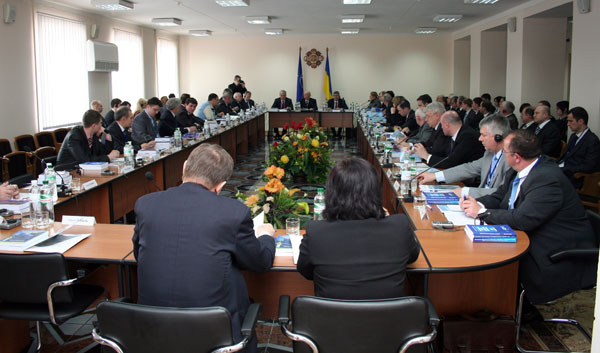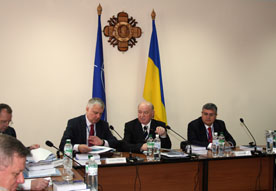Civil society, democracy, human rights and the security services
Relations between civil society and the security services were the subject of an international conference that took place in Kharkiv, Ukraine, on 19 April 2011.

The event, entitled “Security Service and the Public: Interaction and Mutual Responsibilities”, was organized by Ukraine’s Security Service (known in Ukraine as the SBU) in cooperation with with the Yaroslav Mudryi National Law Academy, the National Institute for Strategic Studies, the Geneva Center for Democratic Control of Armed Forces, OSCE, and the NATO Liaison Office in Ukraine.
In his opening remarks, NATO Assistant Secretary General for Defence Policy and Planning, Ambassador Hüseyin Diriöz, stressed that this conference would focus on a very important aspect of security sector reform in every country – the need to establish an effective relationship between a security service and the public through developing interaction and mutual responsibilities. He also highlighted one of the most demanding challenges facing the intelligence and security community: the need to strike the right balance between the operational requirements that the security forces are tasked with and democratic principles, which they need to adhere to.
First Deputy Chairman of the SBU, Volodymyr Khimey, expressed confidence that “the practice of open and candid discussions on the international expert level facilitates the development of mutual understanding, constructive relations, and elaboration of joint approaches to problems of the activities of security services.”
Participants in the conference included the leadership of the Security Service of Ukraine, representatives of the National Security and Defence Council of Ukraine, the Chief Intelligence Directorate of the Ministry of Defence, the Ministry of Foreign Affairs, the State Border Guard Service, the National Institute for Strategic Studies, members of the parliament of Ukraine, foreign diplomats and representatives of special services and international organizations, scholars, experts from human rights organizations and non-governmental organizations.
Reforming Ukraine’s secret services

The objectives of the Kharkiv conference included assessing the experience gained in the past 20 years from SBU reform, considering the relations between the civil society and the security services, addressing the recommendations from partner nations’ security services and independent experts, and strengthening the intellectual basis for ongoing reform of the SBU.
This was the fourth in a series of international conferences on “Promotion of Democratic Values and Compliance with Human Rights in the Activities of Security Services”, which have been conducted annually in Ukraine since 2008 in the framework of the NATO-Ukraine Joint Working Group on Defence Reform.
Over the years, experts have discussed a number of issues related to civil democratic control of the activities of security services, protection of human rights in the process of opening security services’ archives, and joint efforts to counter international terrorism.
This year the conference was taken from the capital to one of the regions of Ukraine with the aim of vitalizing the regional security service agencies’ efforts as well as to engage the young generation to explore fresh ideas and approaches.
Present-day democratic processes require the employees of state security agencies to adhere strictly to the law and to respect the rights and liberties of citizens. So, it was symbolic that the conference took place at the Yaroslav Mudryi National Law Academy, one of the most prestigious legal educational institutions of Ukraine.
In the framework of the Conference an essay contest was held in the educational establishments, which train future personnel for national security structures. Winners of the contest were recognized for their innovative approach and original thinking by the SBU, NATO and the National Institute for Strategic Studies.
Summing up the conference, participants underlined the importance of consistency in the implementation of the recommendations from previous conferences, including steps to enhance interaction between the SBU and civil society. A new set of recommendations was also developed for the consideration of Ukraine’s security sector institutions.
